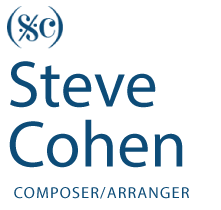11 January 2012
People have these romantic notions about composers, and how they get inspired. In some way, it’s probably in my best interest to foster such notions, but in reality pieces of music rarely come in a blinding flash of inspiration. The real process, usually, is slow and painstaking. Watching paint dry is more exciting to watch.
I’ve had a few instances where whole pieces, or movements, were written in a matter of hours rather than days or months or years. My setting of “Esa Einei” (Psalm 121) was written in one sitting a few days after my mother died in 2002. The middle movement of my Soprano Sax Sonata, Blues, came quickly after news of the death of composer/arranger Ralph Burns, whom I did not know personally but nevertheless admired a great deal.
It’s no good waiting for friends and loved ones to kick the bucket so I can get inspired, so it’s important to have other resources to get the creativity flowing.
Nothing motivates me more than knowing - or at least believing - that what I’m about to write will fill a need of some sort. When I’m lucky enough to garner a commission, I’m told the personnel, the duration, the technical limits, sometimes what text to use, what mood to set, what statement to make, and then all I have to do is fill the order like any bespoke tailor. Sometimes the clients want a piece just like something I’ve already written, in which case I try to balance giving them what they want with some new twist to keep myself engaged.
A commission for money is a fine thing, but I’m also amenable to a “you write it, we’ll perform it” commission. As long as the interest and the desire is there, that’s (mostly) all that matters. If there’s a piece I thought of that I want to write, I’ll sometimes commission myself.
An important thing to keep in mind is how long and how hard one must craft and revise music to make it sound natural and spontaneous. I find it’s a good method to write first and edit later. Let those ideas flow, and don’t worry if they’re any good. They can be mediocre, they can even be terrible; just get them down on paper - or computer - and know that it’s raw material which you’ll process and refine later on. The important thing is to be as un-self-conscious as possible in the early stages of composition, and generate ideas freely and happily.
